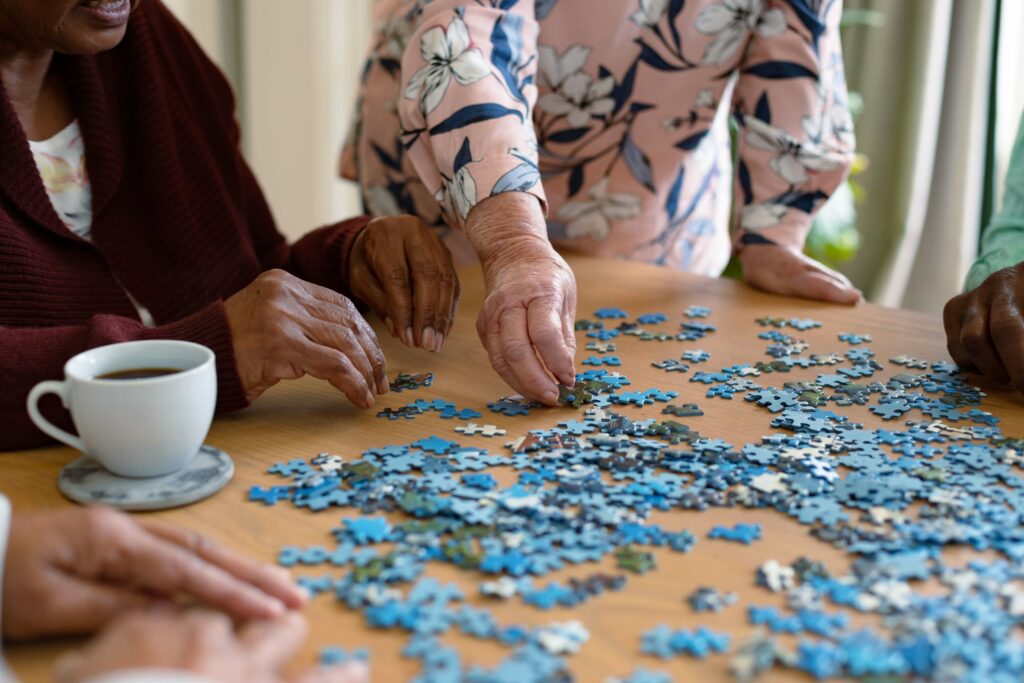Memory plays a crucial role in our daily lives, helping us navigate the world around us. However, when memory lapses become frequent, they may signal something more serious—such as dementia. The 5-word memory test is a simple yet powerful tool used to assess short-term memory recall and detect early signs of cognitive decline. While it’s not a definitive diagnosis, it can help determine whether further medical evaluation is needed.
Routine memory assessments can be valuable, particularly for older adults in senior living communities. The Allouez Senior Living team is here to answer your questions and provide compassionate support. We offer specialized memory care services tailored to your loved one’s needs.
What Is Dementia?
Dementia isn’t a single disease, but an umbrella term for conditions that affect memory, problem-solving, and other cognitive abilities. The most common types of dementia include:
- Alzheimer’s Disease: The most prevalent form, impacting memory and cognitive function over time.
- Vascular Dementia: Often linked to strokes, this type affects thinking skills due to reduced blood flow to the brain.
- Lewy Body Dementia: Characterized by abnormal protein deposits in the brain, leading to hallucinations and motor difficulties.
- Frontotemporal Dementia: Affects behavior, personality, and language skills due to changes in the brain’s frontal and temporal lobes.
- Mixed Dementia: A combination of multiple dementia types, commonly Alzheimer’s and vascular dementia.
While dementia symptoms vary, some common signs include:
- Memory loss affecting daily life
- Difficulty completing familiar tasks
- Confusion with time and place
- Challenges in communication
- Changes in mood or personality
Detecting dementia early allows for better planning, management, and support. That’s where the 5-word memory test comes in.

How Does the 5-Word Memory Test Work?
The 5-word memory test is a short, straightforward assessment often used as part of broader cognitive evaluations. While it’s frequently administered by healthcare professionals, caregivers and family members can also use it as an informal screening tool.
How to Administer the Test:
- Choose five unrelated words (e.g., apple, river, chair, moon, flower).
- Say the words aloud and ask your loved one to repeat them to ensure understanding.
- Engage in a different activity for 2–3 minutes to provide a slight distraction.
- Ask them to recall the five words without prompting.
- Evaluate their recall ability based on how many words they remember.
Understanding the Results:
- 5/5 words recalled: Memory function appears intact.
- 3–4 words recalled: Mild memory impairment may be present. Further evaluation is recommended.
- 2 or fewer words recalled: Significant memory concerns. A medical assessment is advised.
While this test is not a diagnostic tool, poor recall may indicate the need for further cognitive testing.
The Importance of Early Dementia Detection
Recognizing dementia early offers several key benefits:
- Timely intervention: While there is no cure, early treatments may help slow progression and improve quality of life.
- Better planning: Families can explore senior living options, care plans, and legal considerations before symptoms worsen.
- Improved support: Individuals with dementia can benefit from structured routines, memory aids, and social engagement to maintain cognitive function.
Can Lifestyle Changes Help Prevent Memory Loss?
While aging naturally affects cognitive function, certain lifestyle choices can support brain health and reduce the risk of dementia. Encouraging your loved one to incorporate these habits may help protect their memory:
- Stay mentally active: Reading, puzzles, learning new skills, and engaging in stimulating conversations can help keep the brain sharp.
- Maintain a healthy diet: Eating nutrient-rich foods like leafy greens, berries, nuts, and fish supports cognitive function.
- Exercise regularly: Physical activity promotes blood flow to the brain and may reduce dementia risk.
- Prioritize sleep: Poor sleep can affect memory and cognitive performance, so a consistent sleep routine is essential.
- Socialize frequently: Isolation can accelerate cognitive decline, so staying socially connected through friends, family, or community activities is beneficial.
While these strategies aren’t guaranteed to prevent dementia, they promote overall well-being and may slow cognitive decline.
How Senior Living Communities Support Cognitive Health
For seniors experiencing memory challenges, a structured, supportive environment can make a significant difference. Senior living communities like Allouez Senior Living offer specialized memory care programs designed to:
- Provide safe, structured routines to reduce confusion and anxiety.
- Offer engaging cognitive activities, such as memory games, storytelling, and group discussions.
- Encourage physical activity, which has been shown to support brain function.
- Foster social interaction, helping residents maintain meaningful relationships and emotional well-being.
- Make sure personalized care plans tailored to each resident’s cognitive abilities.
If your loved one is showing signs of memory loss, transitioning to a senior living community can provide the care and support they need while maintaining their quality of life.
Take the Next Step
If you’re concerned about a loved one’s memory, don’t wait to seek help. The 5-word memory test can be a simple first step in understanding their cognitive health, but it’s important to follow up with a healthcare professional for a thorough evaluation. Early detection can make all the difference in planning for the future and ensure that your loved one receives the right support.
We’re committed to providing compassionate care and personalized support for seniors experiencing memory challenges. Whether you need guidance on cognitive health, memory care options, or transitioning to a supportive community, we’re here to help. Schedule a consultation with our Allouez Senior Living team today to learn how we can support your loved one’s well-being and quality of life.




